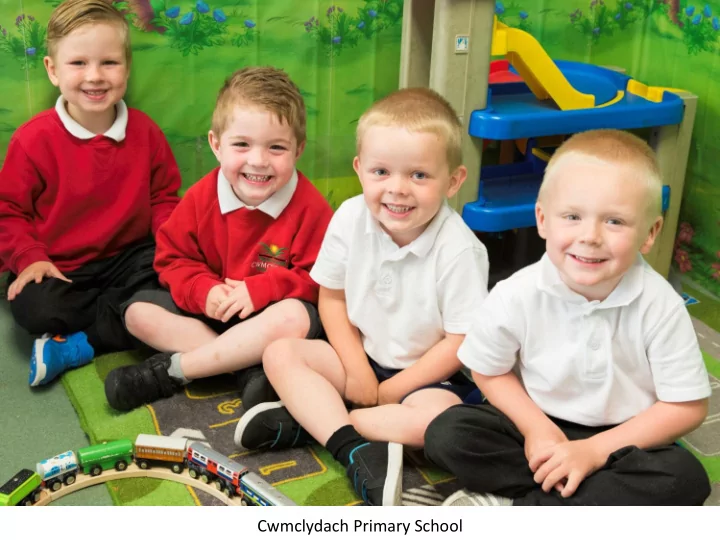

Cwmclydach Primary School
Ministerial taskforce for the Valleys 22 nd September Education
Introductions from • Andrew Llewelyn, Headteacher of Glenboi Primary school, Cynon Valley. • Heather Nicholas, Headteacher of Ferndale Secondary school. • Judith Evans, Principal of Coleg Y Cymoedd
Context issues: Financial • High dependency on benefits • Inability to pay tuition and exam fees • Inability to pay for essential equipment and materials • Inability to pay for childcare • Lack of funds or access to transport • Lack of funds to participate in educational visits • Shelter: • Homelessness
Context issues: Physical and Mental Health • Poor nutrition or hunger • Poorer health and wellbeing • More likely to become parents at a young age • Poor emotional and mental health resilience • Lack of emotional support from within the family
Study Support, Aspirations, Habits • Lack of study facilities at home e.g. computer with internet access • Low literacy and numeracy skills • Lack of aspiration e.g. to progress to HE • Limited life experiences e.g. holiday travel • Erosion of family and community values, habits and lifestyle limit growth • Past educational performance tends to be lower • Perception that anyone who’s successful has left the area • High unemployment and low engagement with school • Jobs supported by European funding – drying up • Parental expectations low, particularly of girls • Few successful family role models in work or higher education
What works in education in the Valleys communities • Focus on oracy – ability to present, speak and be heard • Pupil self perception and wellbeing analysis and follow up in planning • Peer coaching and mentoring models • Uniform, school council, branding – building pride, resilience, independence and high expectations • Focus on values, cultural curriculum and enrichment experiences • Rigour in tracking, focused interventions on specific needs, profiling of vulnerable young people at transition particularly • Community engagement – attendance, team around the family, literacy levels including third sector projects with impact (e.g.Save the Children FAST) • Libraries in school, bringing books to children and ICT - outward facing • Use of Pupil Deprivation Grant and Education Maintenance Grant critical to fund interventions, transport, community engagement and support • Above all – Teaching needs to be better than elsewhere – Leadership, high expectations and whole school strategies critical
What would make a difference (1) Focus on parents and families and their role in education • Resources for parental engagement in basic skills, parenting and aspirations – mums and dads • Employment opportunities and access to employment for parents/ adult role models (transport, readiness, literacy levels) • Improved housing quality and availability • Overly generous benefits create disincentives to work (for those who can work) • Good quality Information Advice and guidance about post 16 and Higher Ed options to build confidence Focus on workforce • Campaign, support and funding for high quality workforce planning (the best teachers, leaders, community workers) • Considerations for transport and access for public sector workforce
What would make a difference? (2) Focus on provision • Models to work with parents on building independence and resilience in young people • Joined up focus to extra curricula opportunities across schools – with cultural, arts resources • Resources to introduce and support HEI choices for more able and talented children • Child and adolescent mental health services very overstretched and experiencing increased demand • Reliable affordable transport to get to college post 16 and transition support • Planning of provision within local community, not too far from it • Information and funding for apprenticeships and pathways into skilled work to match demand in economy • Routes for SMEs to engage in apprenticeship and employment with training routes • Consideration of funding formulae disincentives and benchmark weighting for deprivation • Long term profiling of jobs – higher skills, but young people need L1/L2 to progress to L3/L4 Finally – a joined up approach to funding for these communities, which builds skills, aspirations and removes barriers to achievement at school/college
Ferndale Comprehensive School
Recommend
More recommend